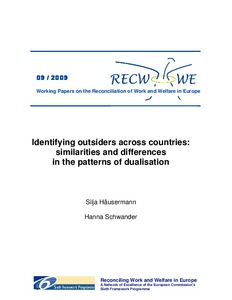Identifying outsiders across countries: similarities and differences in the patterns of dualisation
"This paper makes three contributions: a) it develops a new conceptualization of outsider-status, based on employment biographies, rather than on current labour market status; b) it proposes a new operationalisation of outsiders based on post-industrial class theory and c) it shows empirically...
| Main Authors: | , , |
|---|---|
| Institution: | ETUI-European Trade Union Institute |
| Format: | TEXT |
| Language: | English |
| Published: |
Edinburgh
2009
RECWOWE |
| Subjects: | |
| Online Access: | https://www.labourline.org/KENTIKA-19184552124919027349-identifying-outsiders-across-c.htm |
| _version_ | 1771659897269649408 |
|---|---|
| author | RECWOWE Häusermann, Silja Schwander, Hanna |
| author_facet | RECWOWE Häusermann, Silja Schwander, Hanna |
| collection | Library items |
| description | "This paper makes three contributions: a) it develops a new conceptualization of outsider-status, based on employment biographies, rather than on current labour market status; b) it proposes a new operationalisation of outsiders based on post-industrial class theory and c) it shows empirically who the outsiders are across different countries and across the three dimensions of economic, social and political exclusion.
The empirical analysis shows similar, but not identical sets of insiders and outsiders in different national political contexts. Workers in low-skilled service sector jobs are systematically disadvantaged throughout the developed world in terms of work and pay conditions, social rights and political integration. Low-skilled blue collar workers, by contrast, are outsiders in terms of political integration in all countries, but they are unionized and generally enjoy full social rights. Finally, medium- and high skilled young and female workers in service sector jobs tend to be outsiders in continental Europe, because they are strongly affected by atypical work contracts, lacking trade union mobilization and insufficient social rights. Overall, blue-collar workers suffer from structural economic strains, while high-skilled service workers in continental Europe suffer from political disadvantage, and low-skilled service workers fare worst because they are disadvantaged both economically and politically." |
| format | TEXT |
| id | 19184552124919027349_8bc14a31d64b46b7be1c1181ed42d634 |
| institution | ETUI-European Trade Union Institute |
| is_hierarchy_id | 19184552124919027349_8bc14a31d64b46b7be1c1181ed42d634 |
| is_hierarchy_title | Identifying outsiders across countries: similarities and differences in the patterns of dualisation |
| language | English |
| physical | 38 p. Digital |
| publishDate | 2009 |
| publisher | Edinburgh RECWOWE |
| spellingShingle | RECWOWE Häusermann, Silja Schwander, Hanna equal rights labour market postindustrial society welfare state Identifying outsiders across countries: similarities and differences in the patterns of dualisation |
| thumbnail | https://www.labourline.org/Image_prev.jpg?Archive=115671393385 |
| title | Identifying outsiders across countries: similarities and differences in the patterns of dualisation |
| topic | equal rights labour market postindustrial society welfare state |
| url | https://www.labourline.org/KENTIKA-19184552124919027349-identifying-outsiders-across-c.htm |

